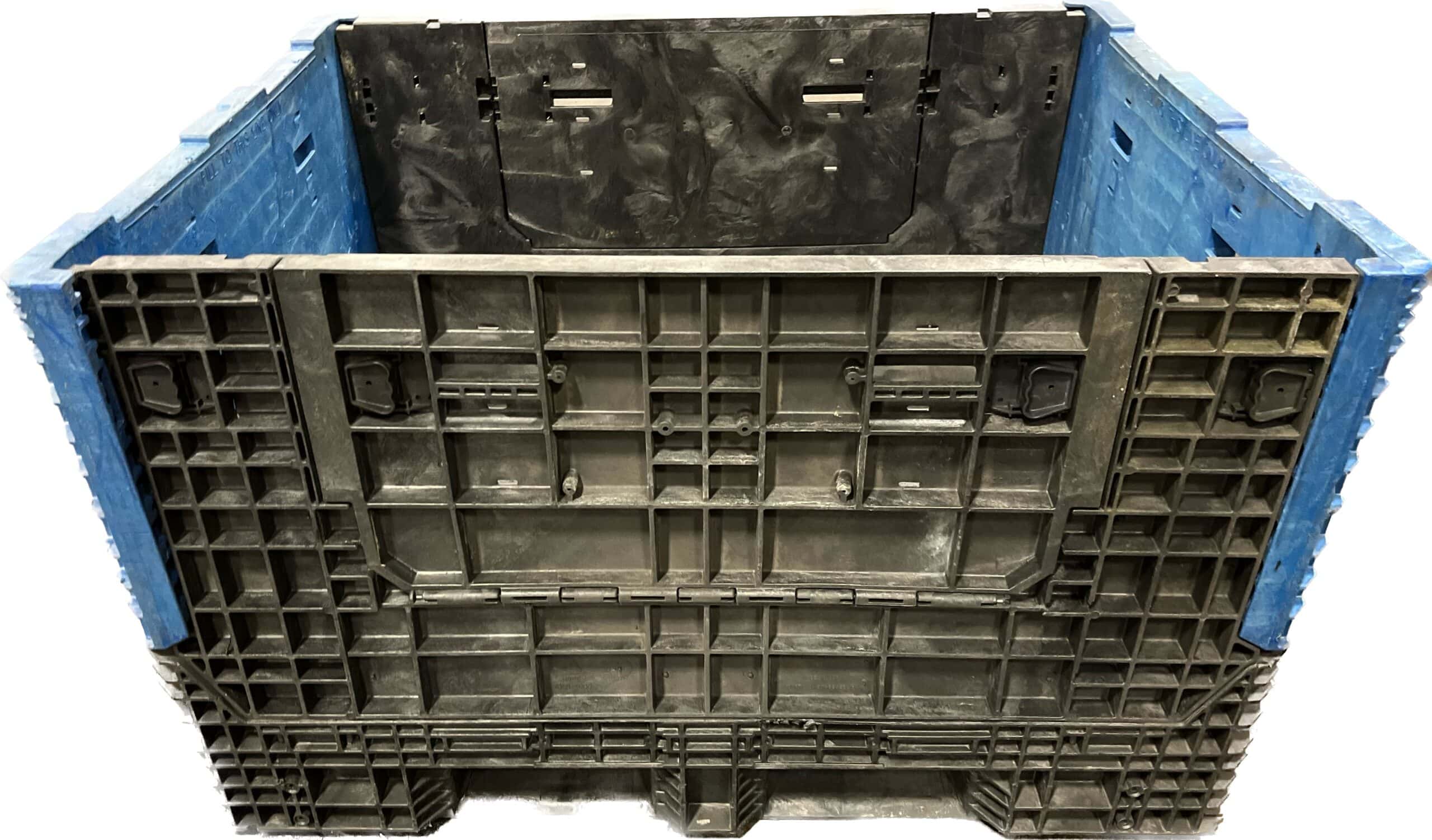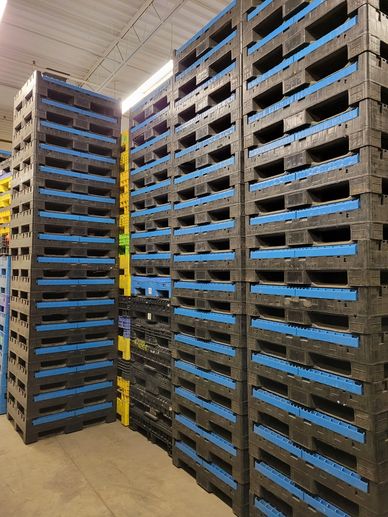Why refurbished bulk containers and used collapsible bulk containers are sustainable assets
Why Bulk Containers Are Important for Sustainable and Economical Transport
Mass containers play an important role in modern-day logistics. They facilitate the reliable activity of large quantities of items, thus enhancing transportation procedures. This approach not just minimizes costs yet additionally lessens environmental impact through lower exhausts and waste generation. As sectors seek even more sustainable methods, the fostering of mass containers is coming to be progressively significant. What effects does this shift hold for future logistics and supply chain monitoring?
The Advantages of Utilizing Mass Containers in Logistics
Mass containers transform logistics by enhancing efficiency and sustainability. These containers permit the transportation of huge quantities of products in a solitary trip, noticeably lowering the variety of trips needed. This not only improves procedures but additionally reduces labor expenses related to handling, packing, and dumping. On top of that, mass containers are made to enhance space utilization within transport vehicles, making sure that more products can be delivered concurrently.
The standardization of bulk containers additionally simplifies the logistics procedure. With uniform measurements, they can be conveniently stacked and kept, bring about improved storage facility administration. Additionally, mass containers frequently include sturdy products that shield contents from damage throughout transportation, thus decreasing item loss and boosting general integrity. Therefore, companies can experience improved supply chain efficiency, eventually bring about boosted profitability and client complete satisfaction. This combination of aspects makes mass containers an essential property in modern-day logistics.
Environmental Impact: Decreasing Waste and Carbon Footprint
As markets significantly prioritize sustainability, the fostering of bulk containers has emerged as an essential technique for reducing waste and decreasing carbon footprints. These containers lessen using packaging products, such as boxes and plastic, thereby especially lowering overall waste generation. By settling shipments, mass containers improve transport efficiency, enabling for even more products to be moved per trip. This decrease in trips straight associates with reduced greenhouse gas discharges, adding to a smaller sized carbon footprint.
Additionally, mass containers can frequently be recycled or recycled, additionally reducing ecological influence. The durability of these containers guarantees they can stand up to multiple transportation cycles, decreasing the need for single-use choices. used plastic containers. By enhancing logistics and promoting reliable source usage, bulk containers not only support sustainable methods but likewise urge sectors to straighten with worldwide environmental goals. Inevitably, their execution mirrors a dedication to environmental stewardship and accountable source monitoring
Cost Cost Savings: Exactly How Mass Containers Lower Transport Expenses
While numerous business look for means to enhance their bottom line, the usage of bulk containers provides a substantial opportunity for decreasing transport costs. Bulk containers optimize the volume of items transported, allowing companies to ship bigger amounts simultaneously. This efficiency reduces the number of trips called for, straight lowering fuel costs and reducing labor expenditures connected with loading and unloading.
Furthermore, bulk containers frequently feature structured styles that optimize space application within transport automobiles. This suggests less empty areas, bring about a lot more effective use offered capacity. Furthermore, the toughness of bulk containers can reduce the threat of item damages during transit, ensuring and reducing losses that more items show up undamaged.
Enhancing Supply Chain Effectiveness With Mass Storage Space Solutions
Mass storage space options play a necessary duty in improving supply chain effectiveness by maximizing stock monitoring. By consolidating items right into fewer, larger containers, services can considerably minimize managing prices related to frequent transfers and handling. This structured strategy permits better tracking and administration of supply, eventually bring about improved functional performance.
Streamlined Supply Monitoring
Reliable supply administration is crucial for optimizing supply chain procedures, especially when companies take on bulk storage services. These options allow businesses to maintain greater stock levels while minimizing the regularity of replenishment. By consolidating materials into mass containers, firms can improve their stock processes, minimizing the complexity connected with tracking several smaller sized packages. This technique promotes precise stock counts and enhances forecasting accuracy, enabling for more informed decision-making. In addition, mass storage services streamline storehouse organization, making it simpler to situate and accessibility items when required. Because of this, organizations can accomplish a much more efficient inventory turnover rate, eventually enhancing overall supply chain performance and decreasing the chance of stockouts or overstock circumstances.

Decreased Handling Costs
The execution of mass storage options not only streamlines inventory administration yet likewise substantially lowers managing costs across the supply chain. By check here combining materials into bulk containers, business decrease the need for constant handling and transfer between various storage space and transport devices. This strategy minimizes labor costs connected with loading, discharging, and relocating smaller packages. Furthermore, mass storage reduces the regularity of deliveries, bring about reduced transport prices and reduced gas usage. As a result, companies can optimize their logistics procedures, permitting a much more reliable allowance of sources. Ultimately, lowered handling expenses add to improved general supply chain efficiency, fostering an atmosphere that supports both sustainability and financial viability.

Flexibility of Mass Containers Throughout Numerous Industries
Several markets have unique demands for transportation and storage space, bulk containers have emerged as a versatile service that satisfies a vast array of demands. These containers, ranging from huge bins to specialized containers, can accommodate varied products, consisting of granules, powders, and liquids. In the agricultural market, mass containers facilitate the transportation of grains and plant foods, while the food and beverage sector utilizes them for active ingredients and finished items. The chemical industry counts on bulk containers for safely delivering unsafe products, guaranteeing compliance with safety and security policies. Additionally, construction firms take advantage of bulk containers for transporting accumulations and other products. Their adaptability includes numerous modes of transportation, consisting of ships, trucks, and trains, enhancing logistical performance. This flexibility not just simplifies operations across different fields but also advertises sustainability by reducing product packaging waste and optimizing room in transit. As a result, mass containers play a vital duty in modern-day supply chain management.
Future Fads in Bulk Container Use and Sustainability
The future of mass container use is significantly formed by innovative products growth that boosts sustainability. Furthermore, automation in logistics assures to improve operations, decreasing waste and improving effectiveness. Embracing circular economic climate practices will better reinvent just how bulk containers are made, used, and reused, fostering a much more sustainable transportation landscape.
Cutting-edge Products Advancement
As industries increasingly focus on sustainability, ingenious materials development wholesale containers becomes a substantial factor in boosting eco-friendly transport options. Researchers and producers are checking out biodegradable plastics, recycled composites, and lightweight metals to minimize environmental impact. These materials not just decrease waste however additionally improve gas efficiency by reducing the overall weight of containers. Furthermore, improvements in wise materials, which can adapt to differing conditions, improve the longevity and capability of bulk containers. The integration of these cutting-edge products straightens with round economic climate principles, advertising reuse and recycling. As the demand for sustainable methods grows, the growth of such products will certainly play an essential duty fit the future of bulk container usage in logistics and transportation.
Automation in Logistics
Substantial advancements in automation are poised to change logistics and the use of mass containers, enhancing sustainability in transport. Automated systems, consisting of drones and self-governing lorries, are streamlining the movement of mass containers, minimizing the dependence on typical fuel-powered transport. These innovations enhance routing and filling processes, boosting and minimizing empty miles fuel efficiency. In addition, automated supply management systems boost monitoring and monitoring of mass containers, ensuring much better source allocation and decreased waste. The assimilation of the Web of Things (IoT) permits real-time information analysis, allowing proactive decision-making that lines up with sustainability goals. As automation continues to evolve, it is anticipated to drive even more advancements in bulk container use, inevitably sustaining even more sustainable logistics techniques and reducing the ecological influence of transportation.
Circular Economy Practices
Improvements in automation are establishing the stage for a more integrated approach to round economic situation practices in the domain name of bulk container use. As markets increasingly welcome sustainability, mass containers are being developed for long life and reusability. This change not only lessens waste however also enhances resource effectiveness. Business are embracing methods such as closed-loop systems, where used containers are collected, reconditioned, and reestablished into the supply chain. Furthermore, smart innovations track container life process, promoting far better management and minimizing environmental effect. The partnership between manufacturers, logistics providers, and end-users is essential in establishing criteria for sustainable container use. used collapsible bulk containers. Future trends suggest an expanding emphasis on materials that are recyclable and eco-friendly, additional strengthening the round economy's principles wholesale transport

Frequently Asked Inquiries
What Materials Are Bulk Containers Usually Made From?
Bulk containers are generally constructed from long lasting products such as high-density polyethylene, aluminum, steel, and cardboard. These materials provide strength, security, and adaptability, making them appropriate for delivering various goods in different industries efficiently.
How Do I Choose the Right Size Mass Container?
Choosing the ideal size bulk container involves evaluating the quantity of materials to be delivered, taking into consideration managing equipment compatibility, and evaluating storage area needs. Proper dimension warranties performance in transportation and decreases waste during shipment.
Are Mass Containers Reusable or Recyclable?
Mass containers are commonly reusable, created for several journeys, enhancing sustainability. Numerous can also be reused, relying on the products made use of. Choosing recyclable alternatives even more supports environmental goals and minimizes waste in transportation practices.
What Safety And Security Rules Relate To Bulk Container Transport?
Safety and security policies for bulk container transport include compliance with the Division of Transport standards, appropriate labeling of harmful materials, architectural stability analyses, and adherence to weight restrictions to ensure secure handling and stop mishaps during transit.
Just How Can Businesses Shift to Using Bulk Containers Effectively?
Businesses can transform to bulk containers by examining present logistics, training staff on handling, spending in ideal equipment, enhancing supply administration, and teaming up with providers to ensure compatibility and efficiency throughout the supply chain.
As markets progressively prioritize sustainability, the adoption of mass containers has actually emerged as a crucial approach for minimizing waste and reducing carbon impacts. By consolidating materials right into bulk containers, companies can streamline their inventory processes, decreasing the intricacy connected with tracking numerous smaller sized packages. As industries progressively prioritize sustainability, cutting-edge products development in bulk containers emerges as a substantial aspect in boosting eco-friendly transport solutions. Automated systems, consisting of drones and autonomous lorries, are streamlining the activity of mass containers, lowering the reliance on traditional fuel-powered transport. In addition, automated stock management systems improve monitoring and tracking of mass containers, guaranteeing better source appropriation and lowered waste.